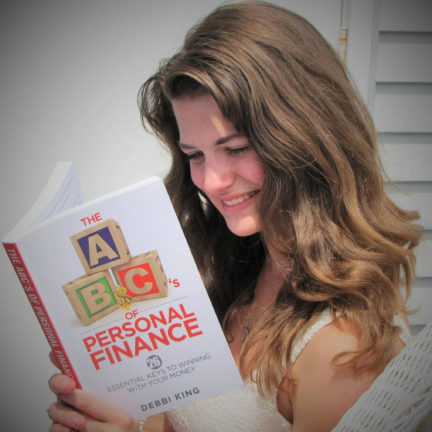Sometimes school education comes up short when it comes to teaching young people real fiscal responsibility. That’s where parents come in! We’ve talked to 19 family and finance experts to ask how they’d teach teens about money and financial independence. If you’re the parent of a teen, take this advice to heart and make sure your child is equipped for their financial future.

Pragmatic Mom
Teens need to set up their own bank account with a debit card and a separate savings account. The bank account should also be set up for checks so that they can learn to write checks and balance their bank account. Don’t assume that something simple like writing a check or knowing how much money is left when using a debit card is obvious. These financial management skills have to be modelled and taught.

Benzinga
You know why I love this question? Because teens literally have every financial advantage possible. I’d love it if on one day a year, every math class in America would stop, put their pencils down, and a math teacher would show them a compound interest chart. Here’s the deal: Let’s say a 15-year old saves just $2,000 a year for seven years. And if he never saved another penny, the money would grow to be $1,000,000 by the time he turned 65.
So, I’d say that teens need to know that the minute they turn 16 and start bagging groceries at Walmart, they should open a Roth IRA. That’ll get you to your $1,000,000 goal. All it takes is seven years.

Inspiring Savings
Money management is a life skill that everyone needs. Teaching our teens the basics of a budget sets them up for success for when they go out on their own. Teaching them how to budget is a big life skill.
If you have older teens that can start earning their own income, have them start paying for “extras.” As parents, we have to cover the basics, such as clothes, food and school needs. Anything that is not deemed a necessity should be covered with your teen’s money. If you budget $50 for jeans and they want the $100 pair, tell them they can make up the difference. Allowing your teen to take more responsibility for the spending will quickly teach them to think more before spending.

Fab Working Mom Life
The most important money tip a teen needs to know is tracking their spending compared to their income (or allowance, as it may be). Knowing where the money is going, and keeping it within the constraints of their funds, is such an important skill to learn early in life.

Debt Discipline
It all starts with knowledge. It’s essential to have some type of formal education, or a mentor, on money as a young adult begins their financial lives. If teens understand things like debt avoidance and compound interest, and if they understand that they do not need to follow the financial paths of others, this will give them an incredible head start. Not everyone wants to pursue financial independence but having the foundational knowledge about money at a young age gives you the tools to achieve any of your money goals.

Family Money Plan
What kids need to know is that they need to get their money to work harder for themselves. When you are young, grasping the basics is key. Earn more than you spend. Save the difference. Invest in things that can grow to give you more money. When you are young, this is a lot easier to do, because you have fewer expenses.
If kids can learn about passive income, and how it works, they can make their money work harder for them from the start. The sooner you start, the sooner you will become financially independent. Just stay the course; it’s worth it in the end.

Kars 4 Kids
Teens are old enough to understand financial planning and responsibility. That makes it a great time to show them how intelligent people manage their spending power. What does that mean? If your child asks you to buy something that is beyond your means, use it as a teachable moment. Instead of saying, “I can’t afford to buy that,” say, “I’m not willing to spend that much for that item, but if you can find it at a better price, I might reconsider.”
This puts the buying power back in your hands, instead of the more helpless sounding, powerless: “I can’t afford it.”
Another way to teach teens is to say, “A new outfit is not in this month’s budget. I plan to put away that amount for your college fund.” It is a powerful lesson to show teens that it’s important to have financial goals, prioritize, and choose the best way to use our money, sometimes even delaying gratification for a long-term benefit.

Money Done Right
- Budget, Budget, Budget
Budgeting may not be the most fun task in the world, but it’s surely one of the most beneficial. The temptation to spend money is everywhere you look, from your local mall to online retailers like Amazon.
The appeal of spending is so strong, that it can be hard for teens to master budgeting. Tracking your spending helps you keep track of your income and, in turn, use your money wisely.
- Make Saving a Habit
The value of saving cannot be expressed enough. The key isn’t how much you’re making or what you’re saving, it’s that you stay consistent. Establishing the habit of saving as a teen will benefit you tenfold through your adulthood. Saving money helps you achieve financial independence, and future-you will surely thank you.
- Learn About the Importance of Credit
Your credit, and in turn your credit score, affects many of life’s most important events. This includes everything from moving out on your own to buying your first car.
Handling credit responsibly is an important part of achieving financial independence.
That’s why it’s important to learn as much about credit as you can. Research what makes up a good credit score and how to use credit responsibly.
For example, a credit card is not free money. Getting a credit card for the first time is exciting! But, remember that the money you spend on your credit card is a loan. Inevitably, you have to pay it back.
Learning about credit will help you make smart financial decisions and
makes a lot of life’s events easier to deal with.

Debbi King
The biggest thing teens need to know in order to be financially independent is to avoid debt at all costs. As long as you have debt, you will never have financial independence. It will always hold you back from reaching independence and wealth. This includes student debt. It is possible to go to college without debt or for a small amount that gets paid back immediately. As long as you owe other people, you will never be truly independent. You can have a great life without debt. Debt is not a necessity, as we are told by the world and social media. If you avoid debt at all costs, you can and will reach financial independence.
One more piece of advice – invest. Compound interest is your friend and the longer you use it, the more “free” money you will have. A person investing from age 25 to age 65 – $100 a month – in a growth stock mutual fund will have around $1.7 million (based on the current 30-year average). That’s pretty independent.

DollarSprout
The biggest thing teens need to know is the importance of compound interest. Compound interest is how time impacts saving, investing and paying off (or incurring) debt. The sooner a time starts investing, the better off they’ll be. An 18-year-old who starts saving $50 a month in an S&P500 index fund will have $2,769.38 by 22 (assuming a 7% interest rate).
Let’s say at age 22 they graduate and find a good-paying job. They can now afford to save and invest $150 a month. In 30 years, they’ll have $206,841.34.
If they hadn’t started saving at 18, they would only have $184,230.67. That’s a difference of more than $22,000 – just for contributing $2,400. The difference becomes starker the more they can contribute later on.
Compound interest also teaches teens the habit of saving. If you can start putting away money at 13 or 16, it won’t be such a big deal to do it at 22 or 25. They’ll already be better off than most of their peers without having to make big lifestyle changes or sacrifices.

DollarSanity
Debt is a dangerous tool: Like a hammer or a chainsaw. It can help you if you know how to use it, but it can hurt you if you don’t. The first step in learning to deal with it is to pay your bills on time, always on time.

Semi-Retire Plan
For teens, I would recommend focusing on financial literacy and investing in themselves.
Once their careers launch, teens will have the opportunity to start contributing to their retirement savings and building wealth. So, I think it’s extremely valuable for teens to start learning how to manage their finances now.
As far as investing in themselves, I recommend that teens (1) avoid or minimize going into debt in the present and also (2) take the opportunity to get an education or other career training. The right, cost-effective education can yield a larger return throughout your career than any other investment.
Of course, #1 (avoiding debt) and #2 (getting an education or training) can be in direct competition at times. So, school choice or choosing a training or education program that is funded in a way other than student loans is a major factor.

Earn More Live Freely
Teens first need to know the importance of tracking their own finances every month. How much money is going out and how much money is coming in? When you spend more than what you earn, it is only a matter of time before you will go broke or get into debt. This might look really simple, yet it is the fundamentals of personal finance. To become financially independent, the very first step is to cultivate the habit of keeping track of one’s finances from a young age.

Savvy Dollar
Being a mom and working in finance, I can tell you that there is no better lesson than teaching your children the value of money.
A big lesson to teach them early is the difference between money that is just given to you, versus the money you have to earn. Have your kids use the money they earned to purchase the things they want. The work can be chores around the house, a part-time job, odd jobs helping neighbors, whatever. Just make sure it is something they have to put some effort into.
Then when it comes time to actually spending their money, make them shop around and do some research. Have your children compare prices at several retailers before making a purchase. My kids were amazed at the difference it makes to shop around and use coupons. Now they would not even dream of paying retail with their hard-earned bucks!
By teaching your teens to earn their money, and then instilling the concept of being a savvy shopper, they will be well on their way to being a financially independent adult.

Dear Debt
Teens should know the value of a dollar in relation to work. When looking at purchases, teens should consider how much work that might be to pay for it. So, for example, when going out to eat, that bill could equate to several hours of work. It’s important for teens to realize the relation between work, time and money. This idea is talked about in Your Money or Your Life, which even teens could read to learn about financial independence.

Money and Bills
How credit works is very, very important. Especially because so many high school graduates are considering signing their name to a student loan. Understanding interest rates and just how much the impact will be on them for paying it back over the years is extremely important. You can only truly understand this importance through having financial awareness. If parents openly discuss the basics of money, cash, credit, and savings with their kids at an early age, it can prevent big financial mistakes after high school. I encourage every parent to start by opening a student checking account for their child.

She Started It!
Teens need to know how to manage their money. Whether it be their allowances or income from a part-time gig, your teenager needs to be taught how to properly use his or her money. Ideally, a bulk of it must be put to savings, a part will go to investments, and whatever is left will be for your teen’s personal expenses.
In relation to the first one, they also need to know how to spend their money wisely. We all were once a teenager, and we know how irresponsible we can get when it comes to spending money. That is why it is very important that we teach our teenagers how to spend their money on things that are worth it, rather than spend it on things that they might just regret buying in the end.

Money Prodigy
In order to become financially independent, your teen needs to know a few things beyond the typical “how to earn money, how to manage money, how to save money, etc.”
Instead, focus on these types of lessons:
- How to set a savings goal, and work towards it
- How to work through making a big financial decision
- How to negotiate pay

Money Therapy
When your children reach their teens, they will get serious about their independence. They may start making impossible financial requests because of peer pressure. They also may engage in after-school activities which can become extremely costly. You will have to be their guiding light, showing them the differences between wants and needs. They also need to experience the good and bad consequences of spending. Allow them to make mistakes without ruining their financial future.
This is the time to introduce them to a debit card. Cut off their access if they make a purchase that isn’t within your agreed-upon limits. Have them make up for this by giving them “debt” like cleaning the house, washing a car, or running errands until they have paid it off. This will be the time that children ingrain what you have taught them throughout their life.
